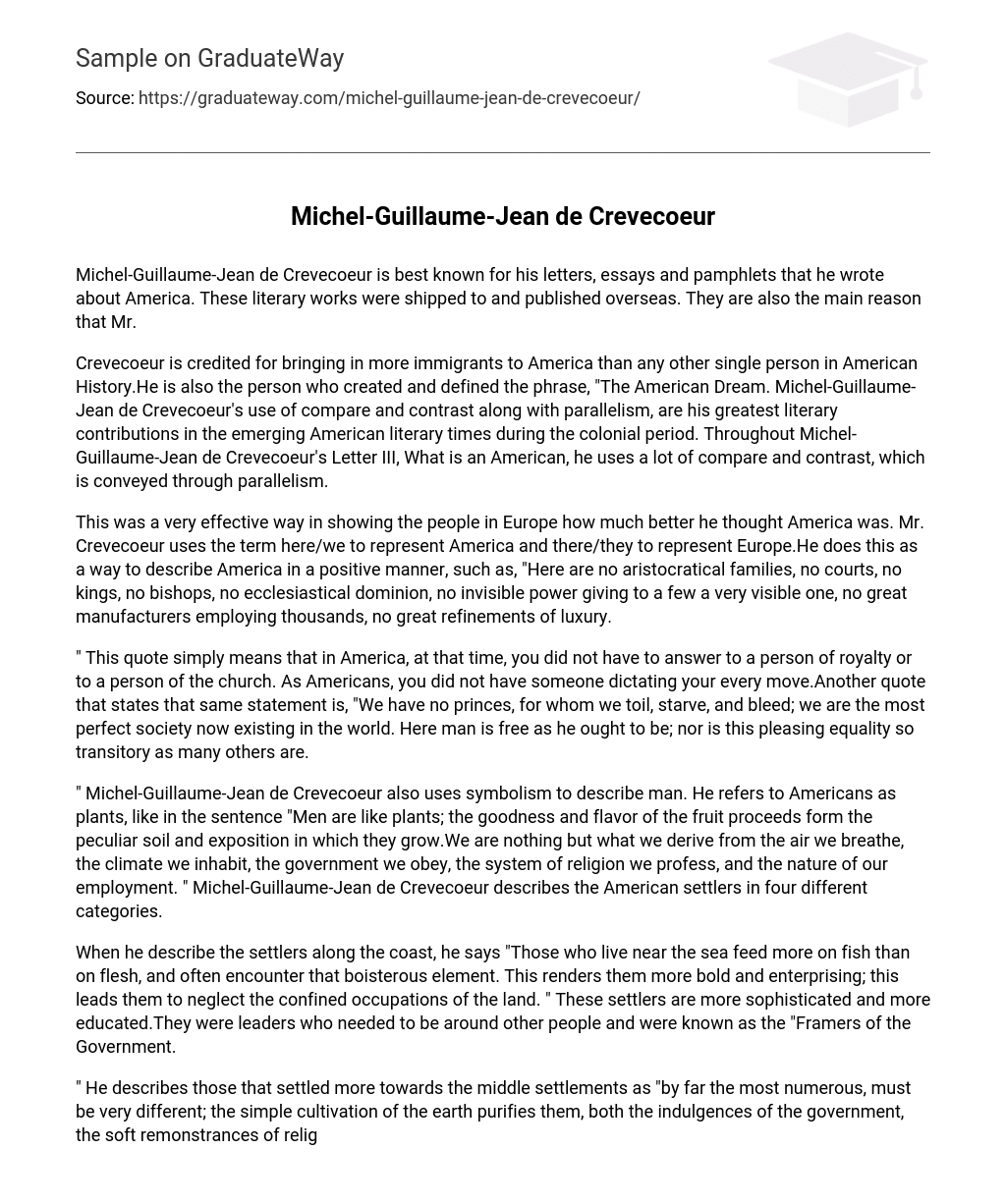Michel-Guillaume-Jean de Crevecoeur gained fame for his writings on America, including letters, essays, and pamphlets. These literary works were distributed and published internationally, contributing significantly to his reputation.
Michel-Guillaume-Jean de Crevecoeur is credited with bringing in more immigrants to America than any other individual in American History. He is also the creator and definer of the phrase, “The American Dream.” His greatest literary contributions during the colonial period in American literature are his use of compare and contrast and parallelism. In his Letter III, titled “What is an American,” Crevecoeur extensively employs compare and contrast, which is conveyed through parallelism.
In order to demonstrate his favorable view of America, Mr. Crevecoeur effectively contrasts it with Europe. He employs the terms “here” and “we” to refer to America and “there” and “they” to represent Europe. This strategy allows him to depict America in a positive light, emphasizing the absence of aristocratic families, courts, kings, bishops, ecclesiastical dominion, invisible power benefiting a privileged few, large-scale manufacturing companies employing thousands, and excessive luxury.
The meaning of this quote is that in America, during that period, individuals were not required to obey a royal or religious leader. Americans did not have someone controlling their actions. Another quote that expresses the same idea is, “We have no princes, for whom we toil, starve, and bleed; we are the most perfect society now existing in the world. Here man is free as he ought to be; nor is this pleasing equality so transitory as many others are.”
Michel-Guillaume-Jean de Crevecoeur utilizes symbolism to depict humanity, specifically Americans. He likens men to plants, exemplified by his phrase “Men are like plants; the goodness and flavor of the fruit proceeds form the peculiar soil and exposition in which they grow. We are nothing but what we derive from the air we breathe, the climate we inhabit, the government we obey, the system of religion we profess, and the nature of our employment.” Through this analogy, Crevecoeur categorizes American settlers into four distinct groups.
According to him, the settlers living near the coast mainly rely on fish for sustenance and frequently interact with the turbulent sea. This lifestyle makes them braver and more adventurous, causing them to disregard the limited activities on land. These settlers possess greater refinement and education. They are influential individuals who seek the company of others and are referred to as the “Framers of the Government.”
“He describes those who settled closer to the middle colonies as ‘by far the most numerous, must be very different; the simple cultivation of the earth purifies them, both the indulgences of the government, the soft remonstrances of religion, the rank of independent freeholders, must necessarily inspire them with sentiments very little known in Europe among people of the same class.’ These were primarily farming communities in small towns. When discussing those who settled further away from the middle colonies, he states ‘If you recede still farther from the sea, you will come into more modern settlements; they exhibit the same strong characteristics in a rougher appearance. Religion seems to have less influence, and their manners are less developed.”
The settlers who were further away from the coast were described as less sophisticated and educated. They had a laid-back and independent attitude, disliking rules and laws. Furthermore, the author notes that these individuals seemed to be placed even farther away from government influence, allowing them to govern themselves to some extent.
These settlers, the wilderness types, renegades, and outlaws, were the least content with laws and rules. They were pioneers, being the most adventuresome amongst them. In addition, Michel-Guillaume-Jean de Crevecoeur incorporated numerous rhetorical questions into his writings.
This is a great method of persuasion. One of the greatest questions that Mr. Crevecoeur asks his readers is, What is an American? He answers the question as “He is either an European or the descendant of an European, hence that strange mixture of blood, which you will find in no other country. I could point our to you a family whose grandfather was an Englishman, whose wife was Dutch, whose son married a French woman, and whose present four sons have now four wives of different nations.”
He is an American who, abandoning his old prejudices and customs, adopts new ones from his new way of life, the new government he follows, and the new social position he occupies. He becomes an American by being welcomed into the vast embrace of our prestigious Alma Mater. Michel-Guillaume-Jean de Crevecoeur also describes the American as a “new individual” who abides by new principles; as such, he must entertain fresh ideas and develop new perspectives. Shifting from involuntary idleness, subservience, poverty, and basic sustenance.
Michel-Guillaume-Jean de Crevecoeur utilized various techniques in his letters during the Colonial period to contribute to the emerging American literary times. His incorporation of Compare and Contrast and Parallelisms stands out as his most impactful contribution. His words have been immortalized on the Statue of Liberty and are echoed in patriotic songs like God Bless America. By comparing America to Europe, he attracted numerous immigrants to the country during that era. Notably, he highlights the hardships endured by Europeans and contrasts it with the freedom and opportunities available in America. He emphasizes how in America, people can partake in the nation’s progress and happiness by working on unrented, untaxed lands without the burden of providing for the church, lords, or government.





